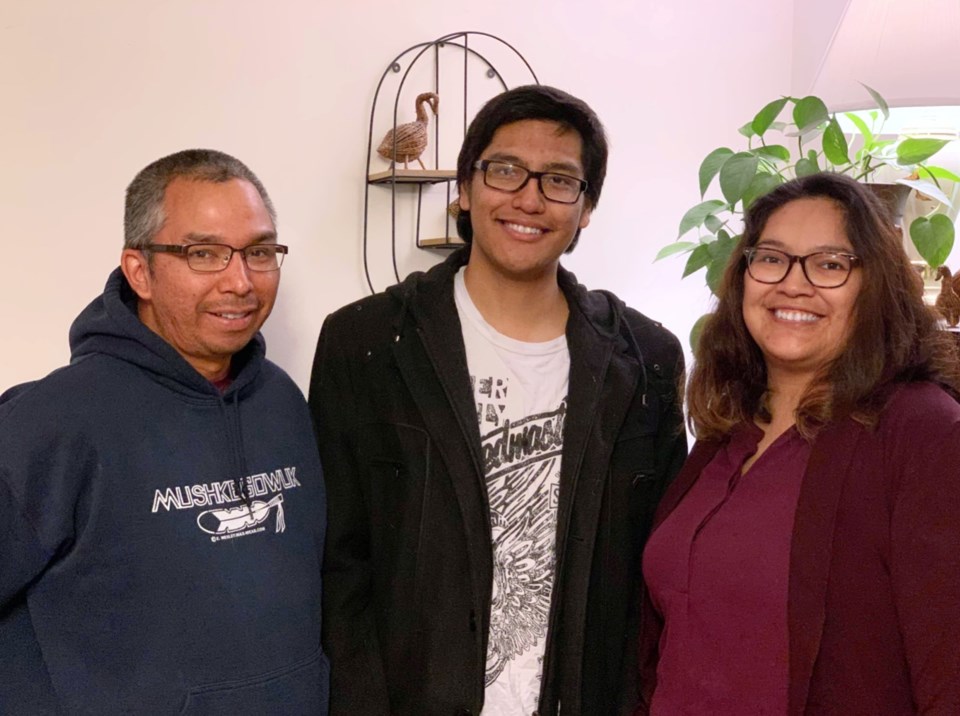A Moose Factory mother is quitting her job and moving down south to help her son who has high-functioning autism and will be starting college this fall.
Leona Chilton, who lives and works in Moose Factory, has three children, all over the age of 19. One of them, Milan Hookimaw, has high-functioning autism.
Hookimaw, 20, received educational funding and is enrolled in a two-year community integration through co-operative education (CICE) program at Georgian College in Barrie. According to Chilton, her son has always been interested in going to college.
To receive financial help from the province, the family applied through the Developmental Services Ontario (DSO) and Ontario Disability Support Program (ODSP). They also looked at applying for OSAP.
Because of the long waitlists, Chilton decided to leave her family in Moose Factory, quit her job and move to Barrie to support her Milan.
Chilton has started a GoFundMe page to raise $8,000 for living and moving expenses. So far, more than $2,500 has been raised.
Starting a fundraiser was a move she made “out of desperation,” she said.
“We feel that Milan shouldn't have to stay home and wait for programming which could take years. We want him to experience life. We feel that if we can do something about it by going with him, then we're absolutely going to do it,” Chilton said.
Her husband Eli and their oldest child will be staying in Moose Factory, while their youngest child will be going to Cambrian College this fall.
The family moved to Moose Factory from Timmins in 2004 and is a two-income household, with the children pitching in financially every now and then.
In spring, the family experienced three deaths within the span of two months. During Chilton’s month off from work, she received employee benefits.
Later, when she gave her employer notice in advance that she would be leaving, she expected that some adjustments would be made to her paycheck. She didn’t expect how much would be cut.
“Due to a recent adjustment in my employee benefits and deduction, I’m bringing home half of what I normally would. From here until the end of my time at work,” she said. “So, saving money to move and for some living expenses to get started, it’s pretty hard.”
Chilton and Hookimaw are planning to move on Sept. 2.
In Barrie, Chilton will be studying the Indigenous community and social development program at the same college. She chose this program to share her experience and help other families who are in a similar situation.
As Chilton doesn’t have a college diploma, “getting the kind of work that I'm good at will be very difficult. And it wouldn't give me the kind of freedom I would need to help Milan if he would need assistance,” she explained.
By the time Hookimaw finishes school, Chilton is hoping the services will be lined up but she’s mentally preparing herself to stay longer down south.
It’s been a lengthy process of applying for provincial help and resources, according to Chilton. Not much training is offered to parents and there’s a lack of services and programs for people with autism aged 18 and over, she said.
“With DSO, we haven't even gotten through the door to get an assessment to see if Milan's eligible and that's a mandatory step that needs to be done. We've been waiting, it's just been forever,” Chilton said advising people whose child is aged 16 to 18 to start applying now.
The Ministry of Children, Community and Social Services said adults 18 years and over with developmental disabilities can access direct funding through the Passport program. Eligible applicants can access a minimum of $5,000. Once the developmental services assessment process is completed, they may receive up to $40,250 based on the priority and need.
Before turning 18, youth and their families can also work with their local DSO office to apply for services and supports. Once they turn 18, they may also be eligible for the ODSP, according to the ministry.
The family is trying to make the best out of the situation, find opportunity and silver lining wherever they can, Chilton said expressing gratitude to the people who’ve donated and encouraging those who can relate to their situation or feel connected to their story to donate.
“I would just want to ensure everybody that I am trying my best to do something good here. And any donations made, it's not going to be squandered,” she said. “It's not like play money or anything like that. It really will help us."
Chilton said she is pursuing two goals: to raise funds and spread awareness about delays and challenges that Ontarians face when they’re looking for services.
“My dream is that one day there will be enough autism spectrum services for all adults who need it. It would raise the quality of life for many,” she said.



